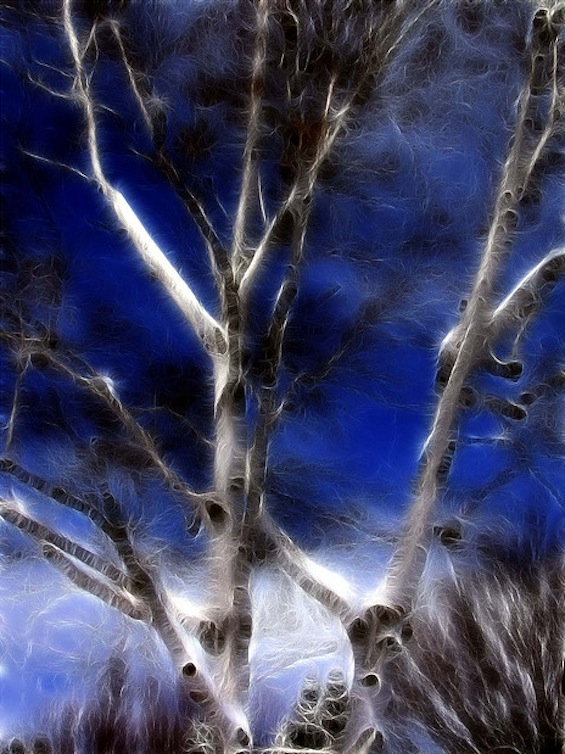Welcome to this month’s poetry classroom, with poet and professor Julie L. Moore. We invite you to respond to the poems we’ll share here—their forms, images, sounds, meanings, surprises—ask questions of Julie and each other, and write your own poems along the way.
Something to Amaze
There is one advantage
in not knowing everything,
in walking through fields
time and time again, still finding
something to amaze—
like these three birches
huddling together, feet
wedged in ice, snow
sifting through their arms.
And the shiver in those arms.
Their silent torsos
thick with acquiescence.
Photo by Lady Dragonfly CC Spring in Michigan. Creative Commons, via Flickr. Poem by Julie L. Moore, author of Particular Scandals
_____
Discussion Questions:
1. The poet says there is one advantage in not knowing everything, yet never states what that advantage is. In your opinion, how does this decision help or hinder the poem?
2. Note the repetition of “in” at the beginning of lines 2 & 3 and the repetition of “arms” at the end of lines 9 & 10. This is a catalog technique. What if the poet had pushed cataloging just a bit further? How might that have changed the poem?
Or, consider the visual effect of these repetitions placed and spaced the way they are; even if the poet did not do this consciously, it can have a slight effect on meaning at the subliminal level. What kind of an effect, in your opinion?
3. Do you hear the repetition of “s” sounds in the last five lines? What kind of feeling does that sound give you? How would this feeling change if, say, the poem repeated a lot of “k” sounds here instead?
Browse poets and poems
Browse more attentiveness poems
Browse more nature poems
- Journey into Poetry: Julie L. Moore - October 16, 2013
- Poetry Classroom: Nuthatch - July 29, 2013
- Poetry Classroom: Universe - July 22, 2013

Tania Runyan says
The “s” sound not only goes with the iciness and snow in the poem; it suggests, to my ears, a whisper. While a “k” would have a cut-off, “crunchy” sound to it, suggesting some finality, the “s” here sort of sneaks and slithers (in a good way) into our souls, like this beautiful and haunting image discovered on a snowy walk.
L.L. Barkat says
i hadn’t thought about it that way, but *yes.* A “k” sound contains finality.
My daughter and I were discussing language the other day, and how it sounds very different from region to region. We were wondering how language may or may not reflect the dominant sounds of a region’s environment as well as the general experience of that environment (would there, for instance, be more “k” sounds in the languages that are in harsh conditions?)
I liked the “s” sounds in this poem. Made me long for the peaceful kind of winter day that is all beauty and wonder.
Jon Lewis says
I enjoy the use of the sylibant hush of s’s, I can feel the slippery soft s’s in the
hushed sounds of snow over the limbs
hushed wind againt trees skins
hushes shivering of the trees
I can almost hear their teeth
chattering/errant flaps of thin
parchment skin
rustling
I would disagree here regarding the advantage to not knowing everything. Which is very clear to me. If one knows everything one cannot therefore be surprised by anything. There could be amazement in discovery.
I like the repetition. I typically use it in 3’s though. 2 is never enough for me and well 4 is just plain silly.
Elizabeth W. Marshall says
Jon, interesting I think I tend to use the repetition you reference in three’s also. I wonder why three feels just right….to me as well.
Elizabeth W. Marshall says
The ‘In’s” draw the reader into the poem, as does the statement that there is “one advantage”. You proceed into the poem, as a maze/puzzle seeking the way in or out. And the s gives you a circuitous route through the poem, the path winds with the sound of s. To me the one advantage is that there is always discovery. Always unknowns, always newness, findings and unveilings along the route. The feet, arms, torso give the trees a humanity/human quality. While the verb huddle is primarily associated with antimate objects. There is something cold and haunting about birch bark and that comes through in the word choices in the last two lines.
Bonnie Lee says
The advantage of not knowing everything is the advantage of child-like wonder. If we can find joy in the natural world then we have the advantage over those who might look at the world through a jaded lens. Or perhaps the advantage is the incentive to keep learning about our world.
Julie L. Moore says
Thanks for all these wonderful comments. Yes, amazement, child-like wonder, discovery. Acquiescence can have both positive and negative connotations. How might this poem be trying to exploit both of those connotations at once? And what does the juxtaposition of the shivering limbs with the silent trunk make you think of?
Elizabeth W. Marshall says
Julie, upon reading this again. I am struck by the silence and shivering word choices. They speak of fear and vulnerability. But they bring to mind a quiet and silent knowing. A trusting because of the rootedness.
I also think of the Trinity when I hear the threes. And certainly there are unknown mysteries and a trusting in a walking out of faith.
Snow sifting through the arms is a picture of what is carried for us, a taking on of burdens by another. Allowing us to not be buried under….were it not for the sifting.
Julie L. Moore says
Oh my, that is so beautifully interpreted, Elizabeth. Thanks so much.